pep人教版小学五年级英语下册知识点总结
- 格式:pdf
- 大小:222.72 KB
- 文档页数:22
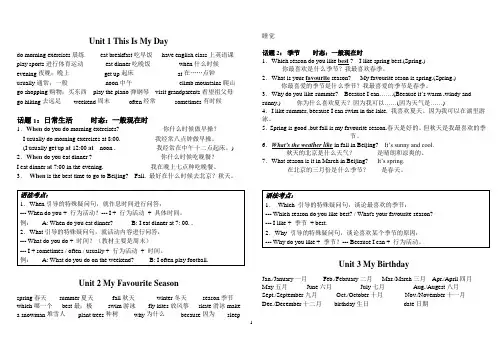
Unit 1 This Is My Daydo morning exercises晨练eat breakfast吃早饭have english class上英语课play sports进行体育运动eat dinner吃晚饭when什么时候evening夜晚;晚上get up起床at在……点钟usually通常;一般noon中午climb mountains爬山go shopping购物;买东西play the piano弹钢琴visit grandparents看望祖父母go hiking去远足weekend周末often经常sometimes有时候话题1:日常生活时态:一般现在时1.When do you do morning exercises? 你什么时候做早操?I usually do morning exercises at 8:00. 我经常八点钟做早操。
(I usually get up at 12:00 at noon . 我经常在中午十二点起床。
) 2.When do you eat dinner ? 你什么时候吃晚餐?I eat dinner at 7:00 in the evening. 我在晚上七点种吃晚餐。
3.When is the best time to go to Beijing? Fall. 最好在什么时候去北京?秋天。
Unit 2 My Favourite Seasonspring春天summer夏天fall秋天winter冬天season季节which哪一个best最;极swim游泳fly kites放风筝skate滑冰make a snowman堆雪人plant trees种树why为什么because因为sleep 睡觉话题2:季节时态:一般现在时1.Which season do you like best ? I like spring best.(Spring.)你最喜欢是什么季节?我最喜欢春季。
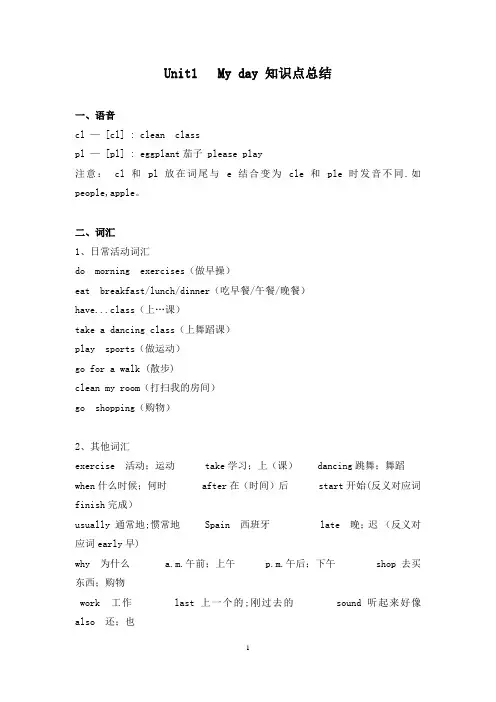
Unit1 My day 知识点总结一、语音cl — [cl] : clean classpl — [pl] : eggplant茄子 please play注意:cl 和 pl 放在词尾与 e 结合变为cle 和 ple 时发音不同.如people,apple。
二、词汇1、日常活动词汇do morning exercises(做早操)eat breakfast/lunch/dinner(吃早餐/午餐/晚餐)have...class(上…课)take a dancing class(上舞蹈课)play sports(做运动)go for a walk (散步)clean my room(打扫我的房间)go shopping(购物)2、其他词汇exercise 活动;运动 take学习;上(课)dancing跳舞;舞蹈when什么时候;何时 after在(时间)后 start开始(反义对应词finish完成)usually 通常地;惯常地 Spain 西班牙 late 晚;迟(反义对应词early早)why 为什么 a.m.午前;上午 p.m.午后;下午 shop去买东西;购物work 工作 last上一个的;刚过去的 sound听起来好像also 还;也busy 忙的need 需要play 戏剧剧本 letter 信Live 居住island 岛always 总是;一直 cave 山洞;洞穴go swimming 去游泳win 获胜。
三、句型以及语法知识点1、询问别人什么时候做某事某种活动的when特殊疑问句型,使用时间短语回答。
When do you do morning exercises? 你何时做早操?I do morning exercises at 7:00.我七点钟做早操。
When do you finish class in the morning? 你们上午的课到什么时候结束?We finish class at 1 o’clock.我们一点钟结束上午的课。
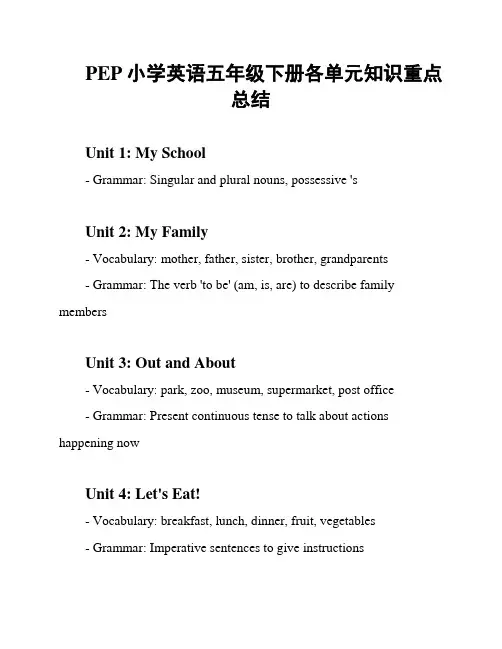
PEP小学英语五年级下册各单元知识重点总结Unit 1: My School- Grammar: Singular and plural nouns, possessive 'sUnit 2: My Family- Vocabulary: mother, father, sister, brother, grandparents- Grammar: The verb 'to be' (am, is, are) to describe family membersUnit 3: Out and About- Vocabulary: park, zoo, museum, supermarket, post office- Grammar: Present continuous tense to talk about actions happening nowUnit 4: Let's Eat!- Vocabulary: breakfast, lunch, dinner, fruit, vegetables- Grammar: Imperative sentences to give instructionsUnit 5: At the Farm- Vocabulary: farmer, barn, cow, pig, chicken- Grammar: There is/There are to talk about existenceUnit 6: Our Town- Vocabulary: street, hospital, police station, fire station, city- Grammar: Prepositions of place (in, on, under, behind, next to)Unit 7: Weather Report- Vocabulary: sunny, cloudy, rainy, snowy, windy- Grammar: Adjectives to describe weatherUnit 8: Fun with Friends- Vocabulary: play, sing, dance, swim, draw- Grammar: Simple present tense to talk about daily activitiesUnit 9: In the Ocean- Vocabulary: fish, dolphin, shark, octopus, seahorse- Grammar: Wh- questions using 'What' and 'Where'Unit 10: Happy Holidays- Vocabulary: Christmas, Easter, Halloween, New Year's Day, Thanksgiving- Grammar: Use of can for ability。
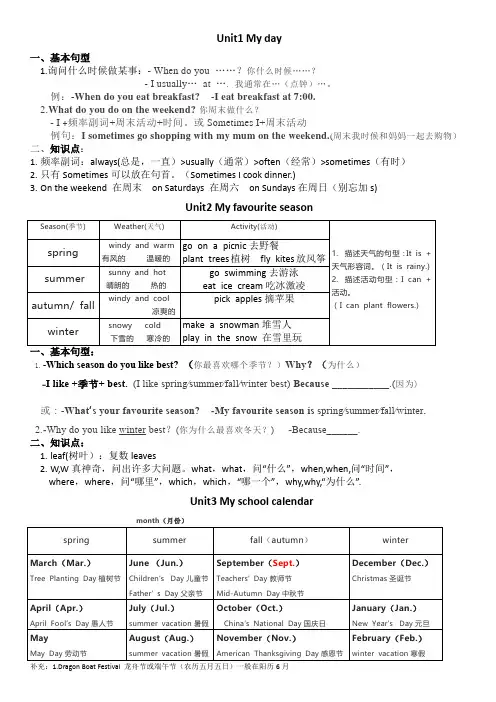
Unit1 My day一、基本句型1.询问什么时候做某事:- When do you ……?你什么时候……?- I usually…at …. 我通常在…(点钟)…。
例:-When do you eat breakfast?-I eat breakfast at 7:00.2.What do you do on the weekend?你周末做什么?- I +频率副词+周末活动+时间。
或Sometimes I+周末活动例句:I sometimes go shopping with my mum on the weekend.(周末我时候和妈妈一起去购物)二、知识点:1.频率副词:always(总是,一直)>usually(通常)>often(经常)>sometimes(有时)2.只有Sometimes可以放在句首。
(Sometimes I cook dinner.)3.On the weekend 在周末on Saturdays 在周六on Sundays在周日(别忘加s)Unit2 My favourite season1.-Which season do you like best? (你最喜欢哪个季节?)Why?(为什么)-I like +季节+ best.(I like spring∕summer∕fall∕winter best) Because ___________.(因为)或:-What‘s your favourite season? -My favourite season is spring∕summer∕fall∕winter.2.-Why do you like winter best?(你为什么最喜欢冬天?) -Because______.二、知识点:1.leaf(树叶):复数leaves2.W,W真神奇,问出许多大问题。
what,what,问“什么”,when,when,问“时间”,where,where,问“哪里”,which,which,“哪一个”,why,why,“为什么”.Unit3 My school calendar补充:1.Dragon Boat Festival 龙舟节或端午节(农历五月五日)一般在阳历6月2.月份首字母大写。
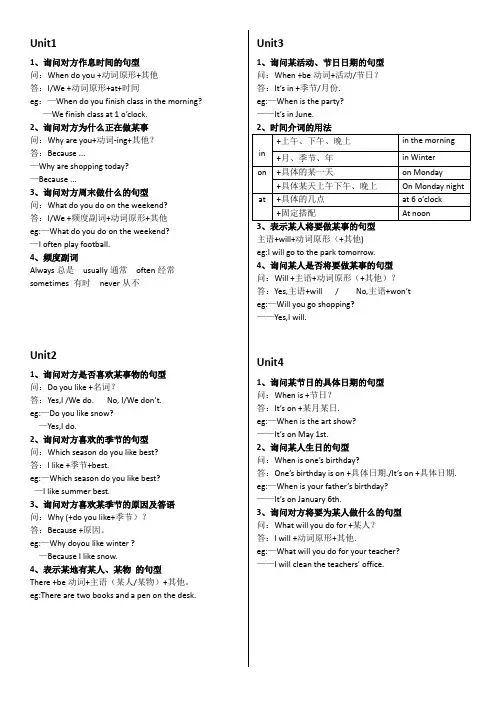
Unit11、询问对方作息时间的句型问:When do you +动词原形+其他答:I/We +动词原形+at+时间eg:—When do you finish class in the morning?—We finish class at 1 o’clock.2、询问对方为什么正在做某事问:Why are you+动词-ing+其他?答:Because ...—Why are shopping today?—Because ...3、询问对方周末做什么的句型问:What do you do on the weekend?答:I/We +频度副词+动词原形+其他eg:—What do you do on the weekend?—I often play football.4、频度副词Always总是usually通常often经常sometimes 有时never从不Unit21、询问对方是否喜欢某事物的句型问:Do you like +名词?答:Yes,I /We do. No, I/We don’t. eg:—Do you like snow?—Yes,I do.2、询问对方喜欢的季节的句型问:Which season do you like best?答:I like +季节+best.eg:—Which season do you like best?—I like summer best.3、询问对方喜欢某季节的原因及答语问:Why (+do you like+季节)?答:Because +原因。
eg:—Why doyou like winter ?—Because I like snow.4、表示某地有某人、某物的句型There +be动词+主语(某人/某物)+其他。
eg:There are two books and a pen on the desk.Unit31、询问某活动、节日日期的句型问:When +be动词+活动/节日?答:It’s in +季节/月份.eg:—When is the party?——It’s in June.主语+will+动词原形(+其他)eg:I will go to the park tomorrow.4、询问某人是否将要做某事的句型问:Will +主语+动词原形(+其他)?答:Yes,主语+will / No,主语+won’t eg:—Will you go shopping?——Yes,I will.Unit41、询问某节日的具体日期的句型问:When is +节日?答:It’s on +某月某日.eg:—When is the art show?——It’s on May 1st.2、询问某人生日的句型问:When is one’s birthday?答:One’s birthday is on +具体日期./It’s on +具体日期. eg:—When is your father’s birthday?——It’s on January 6th.3、询问对方将要为某人做什么的句型问:What will you do for +某人?答:I will +动词原形+其他.eg:—What will you do for your teacher?——I will clean the teachers’ office.1、描述物品归属的句型物品+ be动词(is/are)+(mine/his/hers/yours/ours/theirs) eg:The book is yours.2、确认物品归属地句型问:be动词+this/that/these/those(+其他)+某人的?答:Yes,it is. Yes,they are./ No,it,is’t. No,they aren’t. eg:—Is that crayou his?——Yes,it is.3、询问物品归属的句型问:单数Whose+is it/this/that?复数Whose+are they/these/those?答:It’s/They’re+名词性物主代词/ 名词所有格eg:—Whose bag is this?——It’s mine.4、现在进行时的一般疑问句问:Be动词+主语+动词-ing(+其他)?答:Yes,主语+be动词/ No,主语+be动词+not. eg:—Is she listening to music?——Yes,she is.5、描述某人正在做某事主语+be动词(am/is/are)+动词-ing(+其他).eg:I’m doing my homework now.6、询问某人能否做某事问:Can+主语+动词原形+其他?答:Yes,主语+can. /No,主语+can’t.eg:—Can I play football?——Yes,you can.Unit61、询问多个人或动物正在做什么的句型问:What are +主语(复数)+doing?答:主语(复数)+are+动词-ing+其他.eg:—What are the boys doing?——They are jumping2、询问单个人或动物正在做什么的句型问:What is +主语(单数)+doing?答:主语(单数)+is+动词-ing+其他.eg:—What is Tom doing?——He is playing football.。
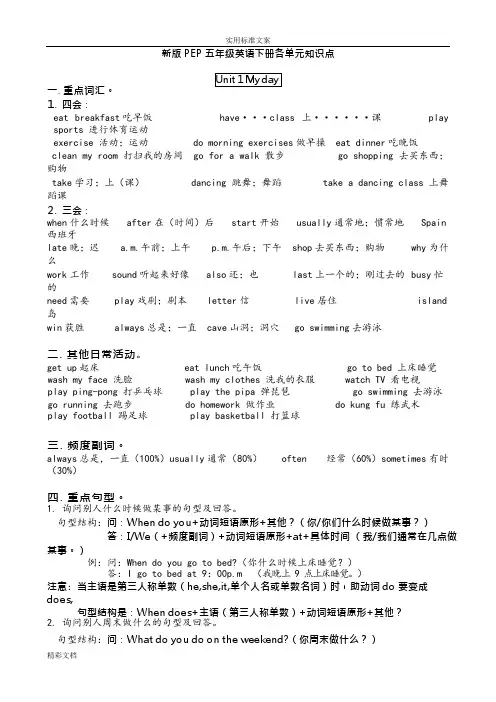
Unit 1 My day新版 PEP 五年级英语下册各单元知识点一. 重点词汇。
1. 四会:eat breakfast 吃早饭 have···class 上······课 play sports 进行体育运动 exercise 活动;运动 do morning exercises 做早操 eat dinner 吃晚饭 clean my room 打扫我的房间 go for a walk 散步 go shopping 去买东西; 购物 take 学习;上(课) dancing 跳舞;舞蹈 take a dancing class 上舞蹈课2. 三会: when 什么时候 after 在(时间)后 start 开始 usually 通常地;惯常地 Spain 西班牙 late 晚;迟 a.m.午前;上午 p.m.午后;下午 shop 去买东西;购物 why 为什么 work 工作 sound 听起来好像 also 还;也 last 上一个的;刚过去的 busy 忙的 need 需要 play 戏剧;剧本 letter 信 live 居住 island 岛 win 获胜 always 总是;一直 cave 山洞;洞穴 go swimming 去游泳二. 其他日常活动。
get up 起床eat lunch 吃午饭go to bed 上床睡觉 wash my face 洗脸wash my clothes 洗我的衣服 watch TV 看电视play ping-pong 打乒乓球 play the pipa 弹琵琶 go swimming 去游泳 go running 去跑步 play football 踢足球do homework 做作业play basketball 打篮球do kung fu 练武术三. 频度副词。
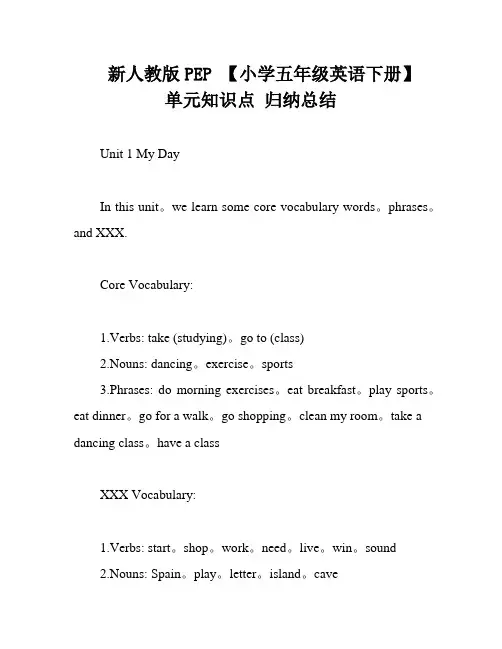
新人教版PEP 【小学五年级英语下册】单元知识点归纳总结Unit 1 My DayIn this unit。
we learn some core vocabulary words。
phrases。
and XXX.Core Vocabulary:1.Verbs: take (studying)。
go to (class)2.Nouns: dancing。
exercise。
sports3.Phrases: do morning exercises。
eat breakfast。
play sports。
eat dinner。
go for a walk。
go shopping。
clean my room。
take a dancing class。
have a classXXX Vocabulary:1.Verbs: start。
shop。
work。
need。
live。
win。
sound2.Nouns: Spain。
play。
letter。
island。
cave3.ns: after4.XXX: when。
XXX。
a.m。
p.m。
why。
last。
also。
busy5.nal Vocabulary: frequency adverbs (always。
usually。
sometimes)Phrases:watch TV。
eat lunch。
go to bed。
go swimming。
go home。
go to schoolCore Sentence Structure:When do you do morning exercises?" "At 7 o'clock."XXX phrase is "good job" to praise XXX.Which season do you like best。
I like winter best。
This sentence means "which one do you like the most" and "like。
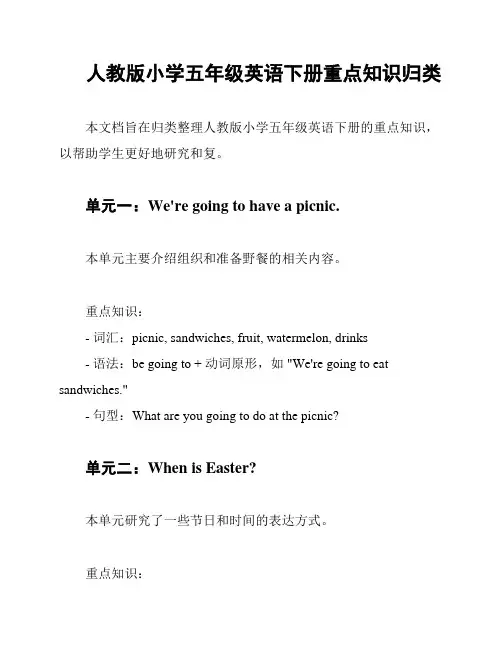
人教版小学五年级英语下册重点知识归类本文档旨在归类整理人教版小学五年级英语下册的重点知识,以帮助学生更好地研究和复。
单元一:We're going to have a picnic.本单元主要介绍组织和准备野餐的相关内容。
重点知识:- 词汇:picnic, sandwiches, fruit, watermelon, drinks- 语法:be going to + 动词原形,如 "We're going to eat sandwiches."- 句型:What are you going to do at the picnic?单元二:When is Easter?本单元研究了一些节日和时间的表达方式。
重点知识:- 词汇:Easter, Christmas, New Year's Day, Halloween- 语法:疑问词when和具体时间的表达,如 "When is Easter?"- 句型:When is Christmas?单元三:Do you want to go to a movie?本单元研究了表达意愿和邀请的相关内容。
重点知识:- 词汇:movie, park, zoo, museum, swimming pool- 语法:do you want to + 动词原形,如 "Do you want to go to a movie?"- 句型:Do you want to go to the park?单元四:Can you swim?本单元介绍了一些体育运动和能力的表达方式。
重点知识:- 词汇:swim, run, jump, skate, ride- 语法:can + 动词原形,如 "Can you swim?"- 句型:Can you ride a bike?单元五:What's the matter with you?本单元主要研究了描述身体状况和感受的表达方式。
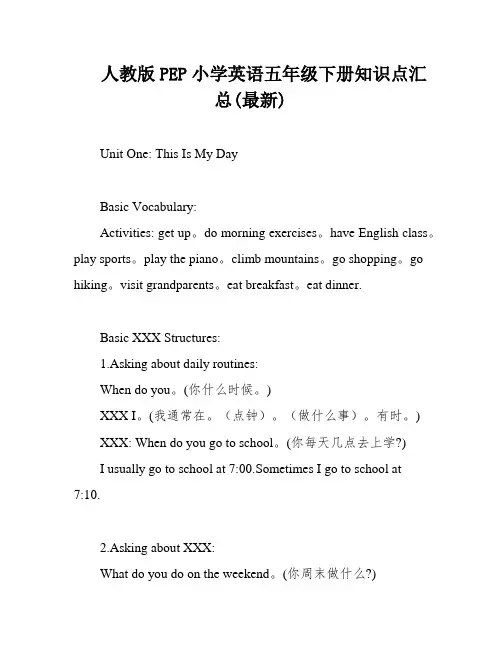
人教版PEP小学英语五年级下册知识点汇总(最新)Unit One: This Is My DayBasic Vocabulary:Activities: get up。
do morning exercises。
have English class。
play sports。
play the piano。
climb mountains。
go shopping。
go hiking。
visit grandparents。
eat breakfast。
eat dinner.Basic XXX Structures:1.Asking about daily routines:When do you。
(你什么时候。
)XXX I。
(我通常在。
(点钟)。
(做什么事)。
有时。
)XXX: When do you go to school。
(你每天几点去上学?)I usually go to school at 7:00.Sometimes I go to school at7:10.2.Asking about XXX:What do you do on the weekend。
(你周末做什么?)XXX I。
(我通常/经常。
有时。
)XXX: What do you do on the weekend?I often play XXX I go shopping with my mom.3.Introducing one's own habits:Every weekend。
I go hiking。
(我每个周末远足。
)Every day。
I do my homework at 8:00 in the evening。
(我每天晚上8点做作业。
)4.Asking XXX:What do you do。
(你是干什么的?)Time:morning。
afternoon。
evening。
noon。
at night。
6:00.on Sunday。
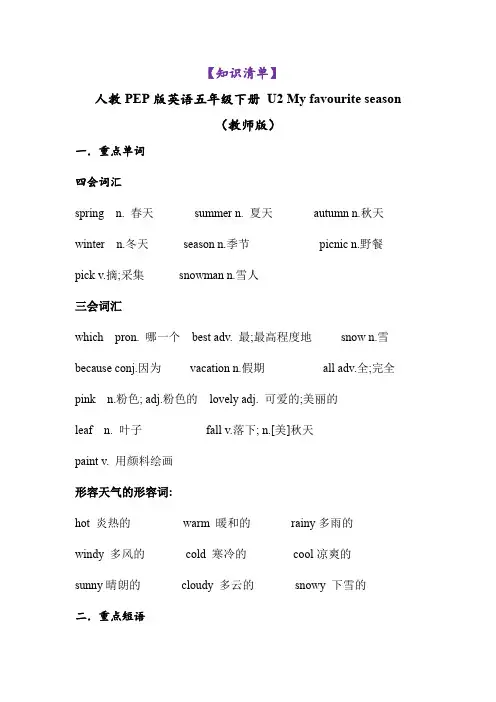
【知识清单】人教PEP版英语五年级下册U2 My favourite season(教师版)一.重点单词四会词汇spring n. 春天summer n. 夏天autumn n.秋天winter n.冬天season n.季节picnic n.野餐pick v.摘;采集snowman n.雪人三会词汇which pron. 哪一个best adv. 最;最高程度地snow n.雪because conj.因为vacation n.假期all adv.全;完全pink n.粉色; adj.粉色的lovely adj. 可爱的;美丽的leaf n. 叶子fall v.落下; n.[美]秋天paint v. 用颜料绘画形容天气的形容词:hot 炎热的warm 暖和的rainy多雨的windy 多风的cold 寒冷的cool凉爽的sunny晴朗的cloudy 多云的snowy 下雪的二.重点短语plant flowers 种花play in the snow 在雪中玩耍play with snow玩雪eat ice cream 吃冰激淋fly kites 放风筝go on a picnic 去野餐pick apples摘苹果;make a snowman堆雪人;good job 做得好; go swimming去游泳. 四.重点句型1. 今天我们将要画季节。
Today we'll draw the seasons.2. 你最喜欢哪个季节?Which season do you like best?3.我可以每天去游泳!I can go swimming every day!4.看我的图片。
Look at my picture.5.颜色很漂亮!The colours are very pretty!6. 为什么? 因为我喜欢暑假!Why? Because I like summer vacation!7.我最喜欢春天。
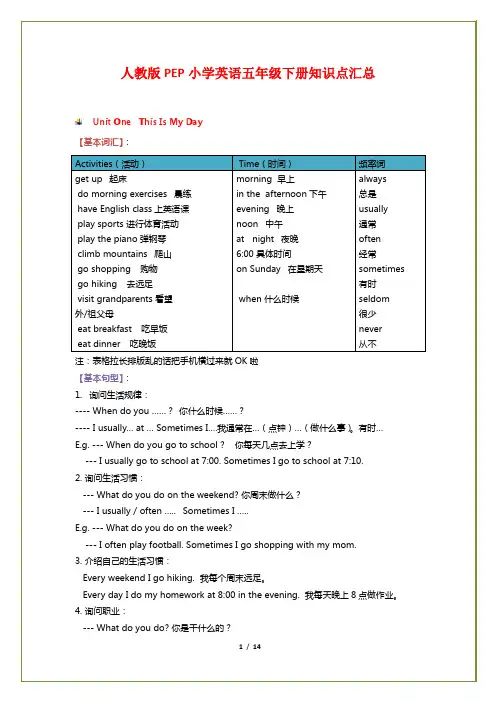
人教版PEP小学英语五年级下册知识点汇总Unit One This Is My Day【基本词汇】:Activities(活动) Time(时间)频率词get up 起床do morning exercises 晨练 have English class上英语课 play sports 进行体育活动 play the piano 弹钢琴climb mountains 爬山go shopping 购物go hiking 去远足visit grandparents 看望外/祖父母eat breakfast 吃早饭eat dinner 吃晚饭morning 早上in the afternoon下午evening 晚上noon 中午at night 夜晚6:00 具体时间on Sunday 在星期天when 什么时候always总是usually通常often经常sometimes有时seldom很少never从不注:表格拉长排版乱的话把手机横过来就OK啦【基本句型】:1. 询问生活规律:---- When do you ……?你什么时候……?---- I usually… at …Sometimes I….我通常在…(点钟)…(做什么事)。
有时…E.g. --- When do you go to school ? 你每天几点去上学?--- I usually go to school at 7:00. Sometimes I go to school at 7:10.2. 询问生活习惯:--- What do you do on the weekend? 你周末做什么?--- I usually / often ….. Sometimes I …..E.g. --- What do you do on the week?--- I often play football. Sometimes I go shopping with my mom.3. 介绍自己的生活习惯:Every weekend I go hiking. 我每个周末远足。
PEP五年级英语下册各单元知识点Unit 1 My day一、重点词汇。
1.四会词汇:eat breakfast吃早饭 have···class 上······课 play sports 进行体育运动exercise 活动;运动 domorning exercises做早操 eat dinner吃晚饭clean my room 打扫我的房间 go for a walk 散步 go shopping 去买东西;购物take学习;上(课) dancing跳舞;舞蹈 take a dancing class 上舞蹈课2. 三会词汇:when什么时候after 在(时间)后start 开始usually 通常地;惯常地Spain 西班牙late 晚;迟 a.m. 午前;上午 p.m. 午后;下午 why 为什么shop 去买东西;购物work 工作last 上一个的;刚过去的sound 听起来好像 also 还;也 busy 忙的 need 需要 play 戏剧;剧本letter 信live 居住island 岛always 总是;一直cave 山洞;洞穴go swimming 去游泳 win 获胜二、其他日常活动。
get up起床 eat lunch吃午饭 go to bed 上床睡觉wash my face洗脸 wash my clothes 洗我的衣服 watch TV看电视play ping-pong打乒乓球 playthe pipa弹琵琶 go swimming去游泳go running去跑步 do homework 做作业 do kung fu练武术play football踢足球 play basketball打篮球三、频度副词。
always总是,一直(100%) usually通常(80%) often 经常(60%) sometimes(30%)有时四、疑问词。
人教版五年级英语下册全册知识点总结回答方式多样,以下是一些例子:I usually play sports or go shopping on the weekend.(我通常在周末进行体育运动或去购物。
)I XXX(我周六上舞蹈课,周日在家休息。
)It depends。
Sometimes I hang out with friends。
sometimes I do some housework。
and sometimes I just watch TV.(这要看情况。
有时我和朋友出去玩,有时我做些家务,有时我就看电视。
)注意:询问别人周末做什么时,可以使用what或how来引导问句。
回答时,可以使用usually。
sometimes等频度副词来表达经常性或偶尔性的活动。
Unit 1一、重点词汇吃早餐:eat breakfast 上······课:have。
class进行体育运动:play sports做早操:do morning exercises 打扫我的房间:clean my room 去购物:go shopping舞蹈:dancing上午:a.m.通常地:usually二、其他日常活动起床:get up上床睡觉:go to bed活动,运动:exercise吃晚饭:eat XXX散步:go for a walk研究,上(课):XXX上舞蹈课:take a dancing class下午:p.m.吃午饭:eat XXX洗脸:XXX洗我的衣服:XXX看电视:watch TV打乒乓球:play ping-pong弹琵琶:play the pipa去游泳:go swimming去跑步:go running做作业:do homework练武术:do XXX踢足球:play football打篮球:play basketball三、语音cl→ [cl]:clean。
人教版五年级下册英语第二单元知识点Unit Two My favourite season 一、词汇spring春天summer夏天autumn秋天winter冬天season季节go on a picnic去野餐pick apples摘苹果play in the snow在雪里玩plant flowers种花eat ice cream吃冰激凌make a snowman堆雪人go swimming去游泳good job做得好which哪一个leaf叶子(复数:leaves)because=because of因为in spring/summer/autumn/winter在春天/在夏天/在冬天/在冬天Children’s Day儿童节in the snow在雪里in the sea在海里fly kites放风筝sleep all day整天睡觉go to school去学校go home回家Merry Christmas圣诞快乐Summer vacation暑假Look at 看I like to swim=I like swimming.二、语法(一)Which引导的特殊疑问句,就最喜欢的季节是哪一个进行提问Which season do you like best?回答:I like+季节+best.或者I like+季节.或者直接说季节名称。
拓展:What is your favourite season?回答: My favourite season is+季节.季节+is my favourite season.(二)What引导的特殊疑问句,就天气进行提问What is the weather like today?回答:It is......(三)What引导的特殊疑问句,就在某一个季节做某事进行提问What do you often do in +季节?回答:I often+具体的事情.三、重要句子Which season do you like best?I like spring best.Why do you like autumn best?Because the colours are pretty.There are beautiful flowers everywhere.I can sleep all day.How about you?=What bout you?I like summer best.because of Children’s Day.Look at my picture.The weather is good and the colours are beautiful.There is lots of snow.I want to paint a picture ,too.What is your favourite season?My favourite season is spring四、语音(辅音字母组合发音)①br发音为/br/br own li br ary br other um br ella br eakfast②gr发音为/gr/gr een gr apes gr andpa gr ow gr ass gr eat五、拓展①Why和because的用法Why 引导询问原因的特殊疑问句。
PEP小学五年级下册英语知识点总结-全册(最新最全)PEP小学五年级下册英语知识点总结全册Unit 1: Daily RoutinesIn this unit。
we learn some main words and XXX。
Some of the main words are: do morning exercises。
eat breakfast。
have English class。
play sports。
eat dinner。
climb mountains。
go shopping。
play the piano。
visit grandparents。
and go hiking。
For example。
when we want to ask someone when they eat dinner。
we can say "When do you eat dinner?" and the answer can be "I eat dinner at 7:00 in the evening." Similarly。
we can ask "When do you get up?" and the answer can be "I usually get up at 12:00 at noon." We can also use some synonyms like have breakfast instead of eat breakfast。
have lunch instead of eat lunch。
and have dinner instead of eat dinner。
We can also use do sports instead of play sports。
and often instead of usually.Unit 2: Seasons and ActivitiesIn this unit。
小学五年级英语下册知识点总结(pep人教版)Unit 1一、重点词汇eat breakfast吃早餐 have...class 上······课play sports 进行体育运动 exercise 活动,运动do morning exercises做早操 eat dinner吃晚饭clean my room 打扫我的房间 go for a walk 散步go shopping 去购物 take学习,上(课)dancing 舞蹈 take a dancing class 上舞蹈课a.m.上午 p.m.下午usually 通常地二、其他日常活动get up起床 eat lunch吃午饭go to bed 上床睡觉 wash my face洗脸wash my clothes 洗我的衣服 watch TV看电视play ping-pong打乒乓球 play the pipa弹琵琶go swimming 去游泳 go running去跑步do homework 做作业 do kungfu练武术play football踢足球 play basketball打篮球三、语音cl→ [cl] :clean clock class cleverpl→[pl] :plate eggplant please play注意:cl 和pl 放在词尾与 e 结合变为cle 和ple 时发音不同。
四、频度副词always总是,一直(100%)usually通常(80%)often 经常(60%) sometimes有时(30%)五、疑问词why 为什么 when 什么时候六、重点句型1.询问别人什么时候做某事的句型及回答。
句型结构:问:When do you+动词短语原形+其他?(你/你们什么时候做某事?)答:I/we(+频度副词)+动词短语原形+at+具体时间. (我/我们通常在几点做某事。
)例:When do you go to bed?(你什么时候上床睡觉?)I go to bed at 9:00 p.m. (我晚上九点上床睡觉。
)注意:当主语是第三人称单数(he,she,it,单个人名或单数名词)时,助动词do要变成does。
句型结构是:When does+主语(第三人称单数)+动词短语原形+其他?2.询问别人周末做什么的句型及回答。
句型结构:问:What do you do on the weekend?(你周末做什么?)答:I(+频度副词)+动词(短语)+其他。
例:What do you do on the weekend?(你周末做什么?)I usually read books. (我通常看书。
)注意:当主语是第三人称单数(he,she,it,单个人名或单数名词)时,助动词do要变成does。
句型结构是:What does+主语(第三人称单数)+do+on the weekend?Unit 2一、重点词汇spring 春天 summer 夏天autumn秋天 winter 冬天season季节 picnic 野餐go on a picnic 去野餐 pick摘pick apples摘苹果 snowman雪人make a snowman 堆雪人 go swimming去游泳which 哪一个 best最because 因为 vacation 假期二、其他1.形容天气的形容词:hot 炎热的warm 暖和的rainy多雨的windy 多风的foggy有雾的 cold 寒冷的cool凉爽的sunny晴朗的cloudy 多云的snowy下雪的2.由go构成的活动短语:go swimming去游泳 go shopping去购物go boating去划船 go skating去滑冰go hiking去远足 go fishing去钓鱼三、语音br →[br]: brown library brother umbrellagr→ [gr] : green grapes grandpa grow四、重点句型1.询问别人天气怎么样的句型及回答。
句型结构:问:What’s the weather like+时间+地点?(······天气怎么样?)答:It’s+表示天气的形容词.例:What’s the weather like in winter in Beijing?(北京冬天的天气怎么样)It’s cold and windy(有风而且寒冷。
)2.询问别人最喜欢的季节句型及回答。
句型结构:问:Which season do you like best? (你最喜欢的季节是哪一个?)答:I like+季节+best. 或直接说季节名称。
同义句还有:What’s your favourite season?3.询问别人喜欢某个季节的原因的句型及回答。
句型结构:来提问。
问:Why do you like+季节名称?或直接用“Why”引导的句子来说明理由,可以从天气相关的活动等方面来答:一般要用“because”说。
例:(1)Why do you like spring?(你为什么喜欢春天?)Because I can go on a picnic.(因为我能去野餐。
)(2)Why do you like summer?(你为什么喜欢夏天?)Because I can go swimming.(因为我能去游泳。
)(3)Why do you like autumn?(你为什么喜欢秋天?)Because I can pick apples.(因为我能摘苹果。
)(4)Why do you like winter?(你为什么喜欢冬天?)Because I can make a snowman.(因为我能堆雪人。
)Unit 3一、重点词汇January一月 February二月March三月 April四月May五月 June六月July七月 August 八月September 九月 October十月November 十一月 December十二月注意:1.月份的首字母一定要大写。
其他月份单词的缩写形式2.May没有缩写形式,September的缩写形式是“Sept”,构成。
都是由单词的前三个字母加“·”3.月份的缩写形式不用在句子中,只能单独使用。
4.表示“在几月”时,要在月份单词前面加介词in。
二、常用节假日名称New Year’s Day元旦( 1.1)Tree Planting Day 植树节( 3.12)Easter 复活节(每年春分月圆之后第一个星期日)April Fool’s Day愚人节( 4.1) May Day 劳动节( 5.1)Mother’s Day母亲节(五月第二个周日)Children’s Day 儿童节( 6.1)Father’s Day父亲节(六月第三个周日)Teacher’s Day教师节(9.10)National Day国庆节(10.1)Mid-Autumn Day 中秋节(农历八月十五)Thanksgiving Day 感恩节(11月第4个周四) Christmas圣诞节(12.25)summer vacation暑假(July and August ) winter vacation寒假三、语音ch→ [ts]: China chicken lunch teachersh→[s]: sheep fish shirt shorts四、活动名称sports meet 运动会 Easter party 复活节聚会school trip 学校旅行 Chinese test 语文测试singing contest歌咏比赛 birthday party生日聚会五、介词in 、on、at的用法。
1.in +上午/下午/晚上/月份/季节/年份。
如:in the morning, in April, in winter, in 20152.on+具体的某一天。
如:on Monday, on April 3rd, on Friday morning3.at +具体的时间点或与其他词构成固定搭配。
如:at 6:00 , at noon六、重点句型1.问答某个活动或节日在几月份的句型及回答。
句型结构:问:When is+ the +活动或节日名称?(注意:节日开头字母要大写)答:It’s in+月份.例:(1)When is the trip this year ? (今年的旅行在什么时候?)It’s in October. (在十月)(2)When is Christmas?(圣诞节在什么时候?)It’s in December.(在十二月。
)2.询问别人将要做什么的句型及回答。
句型结构:问:What will you do+其他?答:I will...=I’ll...例:(母亲节你将为你妈妈做什么?)What will you do for your mum on Mother’s Day?I’ll give her some flowers.(我将送给她一些花。
)的句型。
3.表达“我们将要···”We’ll/We will + 动词原形. 这是一个一般将来时的句子,表示将来某个时间要发生的动作或事情。
例:We’ll have a school trip.(我们将有一次学校旅行。
)We’ll have a singing contest.(我们将有一次歌咏比赛。
)We’ll take a dancing class.(我们将要上一节舞蹈课。
)Unit 4一、重点词汇first(1st) 第一 second (2nd)第二third (3rd)第三fourth (4th)第四fifth(5th) 第五sixth(6th) 第六seventh(7th)第七 eighth(8th)第八ninth(9th)第九tenth(10th) 第十eleventh(11th)第十一twelfth(12th)第十二thirteenth(13th) 第十三 fourteenth(14th) 第十四fifteenth(15th)第十五 sixteenth(16th)第十六seventeenth(17th) 第十七eighteenth(18th) 第十八nineteenth(19th) 第十九twentieth(20th) 第二十twentieth-first(21th) 第二十一 twentieth-second(22nd) 第二十二twentieth-third(23rd) 第二十三thirtieth(30th) 第三十二、用序数词表示具体的日期在英语中,“几月几日”可以先说“月”,再说“日”,其中“日”要用序数词。